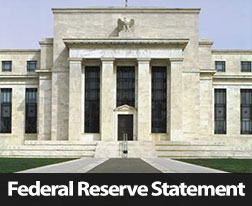FOMC Statement: Fed Holds Steady on Rates
 According to statement issued at the conclusion of today’s Federal Open Market Committee meeting, committee members decided against raising the target federal funds rate. Mixed economic conditions, slower economic growth in the 4th quarter and low inflation contributed to the decision against raising rates. The target federal funds rate was raised in December to a range of 0.25 to 1.59 percent after remaining at 0.00 to 0.25 percent for several years. While rising fed rates were expected to cause a hike in mortgage rates, mortgage rates fell after December’s rate hike.
According to statement issued at the conclusion of today’s Federal Open Market Committee meeting, committee members decided against raising the target federal funds rate. Mixed economic conditions, slower economic growth in the 4th quarter and low inflation contributed to the decision against raising rates. The target federal funds rate was raised in December to a range of 0.25 to 1.59 percent after remaining at 0.00 to 0.25 percent for several years. While rising fed rates were expected to cause a hike in mortgage rates, mortgage rates fell after December’s rate hike.
Committee Cites Mixed Data in Decision
While labor conditions and housing markets continue to improve, FOMC members said that further improvement in labor markets and achieving the medium term goal of inflation influenced the committee’s decision not to raise rates. The Federal Reserve has a dual goal of achieving maximum employment and 2 percent inflation. While labor conditions continue to improve, the Committee wants to see further improvement. The inflation rate has stubbornly stayed below 2 percent and lower energy and non-energy import prices caused the inflation rate to fall further in recent weeks. The Fed also downgraded its reading of household spending and business investment growth from “strong” to “moderate.”
FOMC members consider global economic and financial conditions as well as trends and developing news affecting domestic economic and financial developments. Wednesday’s statement emphasized that constant monitoring and analysis of financial and economic readings are significant in monetary policy decisions. Analysts noted that recent economic developments including slowing economic growth in the US and China, along with resulting turbulence in financial markets likely contributed to the Fed’s decision not to raise the federal funds rate.
FOMC Says Policy Decisions to Remain “Accommodative”
Members of the FOMC do not expect marked economic improvement in the short term and said that they expect Fed monetary policy to remain accommodative “for some time.” This suggests that rapid rate hikes are not likely to occur in the near future; the Fed’s commitment to gradual rate increases is expected promote further improvements in labor markets and hold down borrowing rates for consumer credit and mortgages.
The Committee’s vote not to increase rates was unanimous. The next FOMC meeting is set for March 15 and 16. In the meantime, Fed Chair and FOMC Chair Janet Yellen is slated to testify before Congress about the economic outlook on February 10 and 11.

 Buying a home isn’t cheap. But if you’re determined to become a homeowner, the FHA home loan program can help. This loan program, ideal for first-time buyers with low incomes, can help you to build your credit and make home ownership a reality.
Buying a home isn’t cheap. But if you’re determined to become a homeowner, the FHA home loan program can help. This loan program, ideal for first-time buyers with low incomes, can help you to build your credit and make home ownership a reality. If you’re planning to remodel or renovate your home in the near future – whether to provide a better living environment or as part of a house flip – you’ll need to find a way to pay for your home improvements. There are several different possible sources of renovation money, each with their own advantages and disadvantages. One option that is gaining popularity is mortgage refinancing.
If you’re planning to remodel or renovate your home in the near future – whether to provide a better living environment or as part of a house flip – you’ll need to find a way to pay for your home improvements. There are several different possible sources of renovation money, each with their own advantages and disadvantages. One option that is gaining popularity is mortgage refinancing.